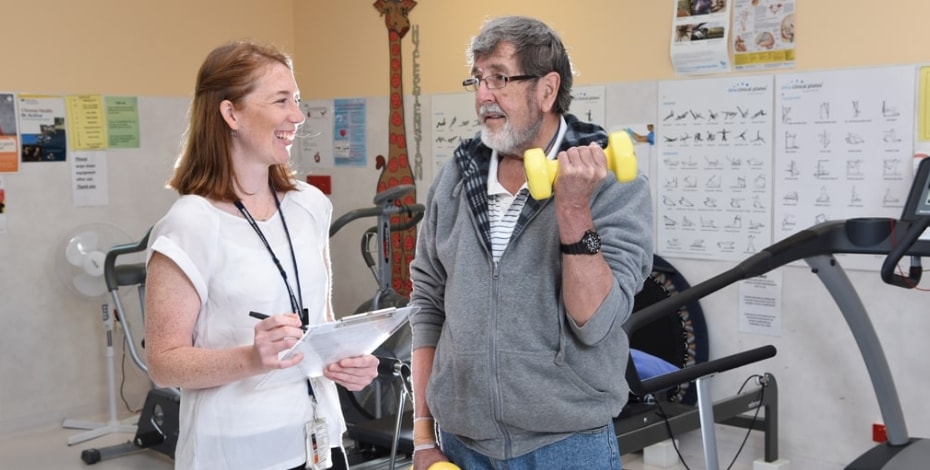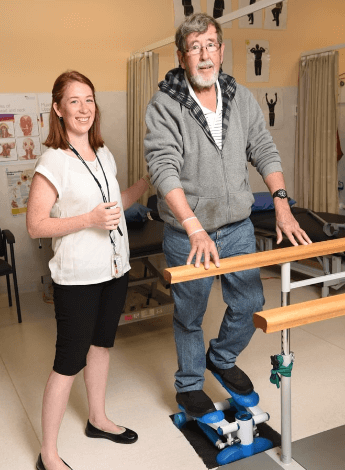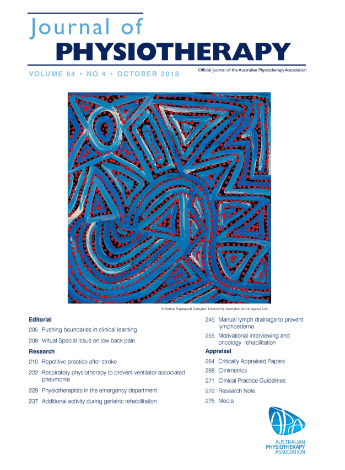
Motivational interviewing and oncology rehab

Amy Dennett and patient from the Eastern Health Oncology Rehabilitation Program.
Cancer and its related treatments can lead to devastating impacts on people’s quality of life, causing significant physical and psychological impairments and increasing their risk of future chronic disease. Lead author Amy Dennett, APAM, discusses how motivational interviewing added to oncology rehabilitation did not improve moderate-intensity physical activity in cancer survivors.
Can you explain oncology rehabilitation?
Oncology rehabilitation is defined as any intervention that aims to treat patients’ physical, psychological and cognitive impairments to maintain or restore function, reduce symptom burden, maximise independence and improve quality of life after a cancer diagnosis. In Australia, cancer-specific rehabilitation is typically delivered in an outpatient setting, similar to cardiac rehabilitation.
What makes people unable to bounce back to their previous physical activity levels?
Cancer and its associated treatments take a big toll on patients’ physical and psychological functioning, and puts patients at risk of further chronic disease and cancer recurrence. These impairments have a significant impact on quality of life and participation, including reduced physical activity. There are many reasons why people struggle to regain their pre-treatment physical activity levels. Reduced physical capacity is a major reason. Low motivation and confidence to participate in physical activity are also significant factors.
What are the known benefits of oncology rehabilitation?
There is a large body of evidence that exercise-based oncology rehabilitation reduces treatment side-effects, especially fatigue, improves physical capacity and fitness, and enhances emotional wellbeing. In addition, while we do not have randomised controlled trial (RCT) data that exercise-based rehabilitation improves survival, large observational studies suggest that being more active after cancer diagnosis reduces mortality and recurrence. However, we do not know if participating in short-term exercise-based rehabilitation actually improves physical activity participation.

Amy Dennett helping a patient on the road to recovery
What was the design of the study?
We completed a single-blinded RCT.
Did things go to plan, or did the study deviate from the intended protocol?
The study was conducted mostly to plan. However, the very low levels of moderate-to-vigorous physical activity performed by this group meant the analysis was changed slightly.
Did the participants in either group tolerate the exercise-based rehabilitation well?
Exercise-based rehabilitation was well tolerated by both groups. There was a low number of adverse events and these were mostly due to cancer-related issues outside of the rehabilitation program.
What were the results? Did motivational interviewing help?
We had mixed results. Contrary to our hypothesis that motivational interviewing would improve levels of moderate-to-vigorous physical activity more than standard rehabilitation, levels of physical activity remained relatively unchanged after rehabilitation in both groups; however, there was a non-significant but potentially moderate-to-large treatment effect that motivational interviewing was useful for reducing sedentary time, and increased light physical activity.
Was the evidence very strong that motivational interviewing cannot help, or was there uncertainty in the non-significant results that leave them open to further investigation?
Our sample size was reasonably small and therefore potentially underpowered to detect changes in sedentary behaviour and other physical activity outcomes, such as stepping and light activity. The uncertainty related to these outcomes warrants further investigation for the role motivational interviewing can play in this area.
Are there any other interventions that are more successful at shifting this population from sedentary to active?
There is some good evidence that telehealth interventions can improve physical activity in cancer survivors. There are also some promising trials of longer duration, community-based exercise programs helping cancer survivors become more active. Therefore, after oncology rehabilitation further support to improve physical activity of cancer survivors through interventions such as these may be required.
Amy Dennett recently completed her PhD on physical activity and oncology rehabilitation at La Trobe University. Amy also works clinically as a senior physiotherapist in the oncology rehabilitation programs at St Vincent’s Private Hospital Melbourne and Eastern Health.
© Copyright 2024 by Australian Physiotherapy Association. All rights reserved.






